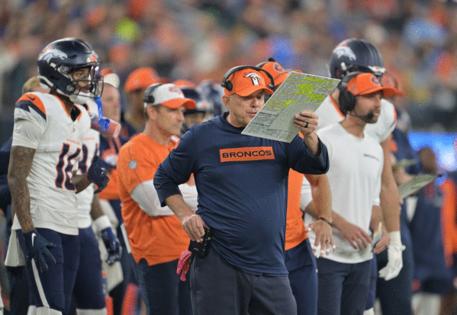Tom Krasovic: Sean Payton's bad move led to Chargers historic kick
Published in Football
SAN DIEGO — That was some strange football chess that unfolded last week in the Kroenke Dome, assisting the Los Angeles Chargers against the Denver Broncos.
By now the football world knows how the first half ended.
With no time on the game clock, the Chargers made a fair catch kick, an oddity that surfaces every half century or so. The three points sparked a rally that led to the 34-27 victory, all but ensuring Jim Harbaugh’s first Bolts team will reach the playoffs.
Older San Diegans might remember the previous successful fair catch kick in the NFL, also by the Chargers, coming in 1976.
Memorable as well Thursday night, but easy to overlook, was this:
Broncos coach Sean Payton made the historic kick possible by choosing not to run out the clock after Harbaugh invited him to do so.
Payton’s decision, a poor one regardless of outcome, came within back-and-forth chess between two of the NFL’s highest-paid coaches.
First, Harbaugh in effect waved the white flag on the first half by choosing not to call timeout. He’d jut seen his defense make a tackle for loss on a first-down screen play. The 3-yard loss put Denver on its 15 with the Chargers trailing, 21-10. The game clock was at 34 seconds when the whistle blew to reset the play clock to 40 seconds.
Tick … tick … tick. Still no timeout came from Harbaugh. So this seemed certain: Payton could let the half run out by doing nothing.
Payton responded with a fuzzy thinking, having his offense snap the ball with 17 seconds left.
The only reason to snap the ball would be to try to score more points. Those odds were long, as the Broncos needed to gain about 40 yards to set up field goal try of 63 yards.
Whether or not the second-and-13 play was in fact what Payton had in mind, it had no realistic chance of getting a first down. Bo Nix took a three-step drop, didn’t look downfield and threw a generic short pass over the middle, toward a running back as defenders lurked nearby. The rookie’s fastball was wide and low, stopping the clock with 13 seconds.
Payton had given the Chargers a chance to get the ball near midfield; they availed themselves, stuffing a third-and-13 run and calling timeout.
Anti-Belichick
A few years ago, after he’d left the New England Patriots, Tom Brady revealed Bill Belichick’s approach to game theory near the end of a first half when holding a lead.
If the Patriots had the ball, the first objective was to keep the opponent from scoring before halftime.
The second objective was to kick a field goal. The third was to score a touchdown.
Payton didn’t heed Belchick’s first objective. After the game, when asked about his team’s final possession of the first half, he gave a vague answer.
“We’re going to see if we can get a little momentum going, and then run the clock down,” he said.
Payton has had a fine season. The Broncos (9-6) stand in playoff contention. Entering this season, I wrote they’d finish with a bottom-10 record.
Fouts chimes in
The Chargers were able to attempt the fair catch kick after punt returner Derius Davis’ fair catch at L.A.’s 38. Because of fair catch interference, the ball was moved to Denver’s 47. Per what Harbaugh described as his favorite rule in football, the Chargers didn’t have to snap the ball, nor could the Broncos muster a rush.
Cameron Dicker nailed the 57-yarder, pulling L.A. to 21-13.
The strangeness didn’t end there. Dan Fouts was watching the Amazon Prime telecast, and via a phone call to a broadcast-team researcher, the Hall of Fame quarterback informed broadcaster Al Michaels he played a role in the 1976 fair catch kick by convincing Chargers coach Tommy Prothro of the kick’s legality.
Ray Wersching’s 47-yard fair catch kick, which came late in the first half, expanded San Diego’s lead on a cold November day at Rich Stadium, where the Chargers went on to beat the Buffalo Bills.
____
©2024 The San Diego Union-Tribune. Visit sandiegouniontribune.com. Distributed by Tribune Content Agency, LLC.







Comments